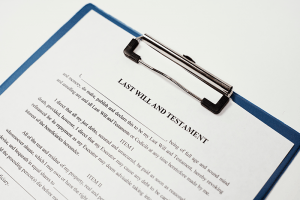
Is the Will Valid?
In general, for a Will to be formally valid it must be signed by the person making it (the Testator) and two witnesses who do not benefit under the Will. This is the typical method for most Wills. However, sometimes a loved one will come across a Will that was written out and signed by the Testator when sorting through the deceased’s papers. This type of Will is known as a “Holograph Will” and it has different requirements for validity than a regular Will.
Although our world is increasingly electronic, the Succession Law Reform Act requires that a Holograph Will be wholly in the Testator’s own handwriting and signed by the Testator. This means that a Will that is typed out and then signed only by the Testator will not be a valid Will. Courts have applied this requirement very strictly to testamentary papers that do not meet the usual requirements of a Will. The purpose of this rule is to ensure that the testamentary document represents the authentic last wishes of the Testator.
This rule also applies when a handwritten testamentary document refers to another typed document. Although Estate law generally allows you to incorporate another document into your Will by specifically referring to it (such as a codicil or memorandum), a typewritten document cannot be incorporated by reference into a Holograph Will. For example, if a handwritten note is found which seems testamentary and it refers to a typewritten document, like an e-mail or Word document, the typewritten document will not form a valid part of the Holograph Will. This rule applies even where it is absolutely certain that the typed document was made by the Testator.
Another important feature of Holograph Wills is that it must be a “full and final expression of intention as to the disposal of property upon death.” This means that the Will must contain provisions that actually dispose of the Testator’s property. The requirement that the document be final, means that there must not be any indication that the document was not intended to be final. The person who seeks to have the Holograph Will declared as a valid Will has the onus of proving it was written by the Testator and shows a final intention about the distribution of their property.
All of these rules are meant to protect the Testator’s Estate and to ensure that the testamentary document actually contains the final wishes of the Testator. Unfortunately, when a Testator is unaware of these rules (which is usually the case) their application can mean that a Testator’s Estate does not get distributed the way they had intended. If the Holograph Will fails, the Estate will be distributed according to the last prior Will, or, if there is no other Will, by Intestacy rules.
The best way to make sure that your Estate is distributed according to your wishes is to sit down with a lawyer and discuss your plans. A lawyer can assist you with drafting a Will that reflects your plan for your Estate. They can also help you to minimize the tax implications of your Estate, leaving more for your loved ones.
Want more information?
Are you interested in a consultation with Peter R. Welsh?
Contact me at Peter@SmartWills.ca
By telephone 416-526-3121
Register for our blog to get valuable tips and up-to-date alerts.
This material is for general information and educational purposes only. Information is based on data gathered from what we believe are reliable sources. It is not guaranteed as to accuracy, does not purport to be complete and is not intended to be used as a primary basis for investment decisions.



